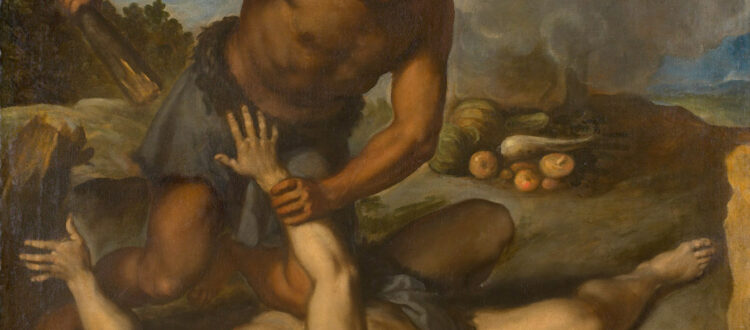25
Oct
Death of a Brother
Death of a Brother
… it begins again. Genesis. Once again we commence the cycle of the weekly Torah readings…
Brother, brother, brother
There’s far too many of you dying
You know we’ve got to find a way
To bring some lovin’ here today
-Marvin Gaye
And it doesn’t take long before a very painful and sad chapter unfolds, a chapter that comes to define much of human history. For indeed this is what Bereshit is all about. It’s about the DNA of Mankind. But not DNA we are born with, but DNA that we choose. The choices we made from the beginning of time, and how we come to repeat those choices for better, but too often, for worse.
Cain and Abel each bring an offering to God, each reaching back to his Creator to touch, to communicate, to express an appreciation for the good that the good Lord has bestowed upon them.
Only one of those gifts is accepted, the other is not. The feelings of failure and all of its outgrowths – rejection, anger and pain – ensue. They percolate, they stew, they build up and eventually they boil over to a point and a place in the heart and soul of Cain that even the interjection of God Himself who offers him a solution, a way out – even that cannot prevent the clash, the conflict and the ultimate act of violence that transpires. Cain murders his brother, Abel.
We don’t need to escalate
You see, war is not the answer
For only love can conquer hate
But what makes this episode so sad and tragic is that it could have so easily been avoided. The solution was there for the taking. It was sitting right there, just as easily attainable as the violent outcome. Cain had a choice. He wasn’t predestined to do what he did.
The former Chief Rabbi of the United Kingdom, Lord Jonathan Sacks cites the French philosopher, René Girard who states that the primary source of violence and tension is sibling rivalry. This certainly is borne out throughout Genesis as in the case of Cain and Abel, Isaac and Ishmael, Jacob and Esau, Rachel and Leah as well as Joseph and his brothers. But again, it doesn’t have to be that way. Brothers and sisters, if they tried, could get along, can work together.
Let us consider an alternative scenario; a different, albeit imaginary ending. Inasmuch as it was Cain who, to his credit, was the initiator of the notion to bring an offering to God in the first place – for the Torah indeed narrates that he was the first one to bring the sacrifice – consider what would have happened if Abel would have maybe thanked his brother for this novel idea. What if he would have said, “You know Cain, I never thought of expressing my appreciation to God for the good He has given us and you are 100% right…I should also show this appreciation by giving back in some way. But, hey, don’t you think we ought to give Him the ‘first and best’ of our labour rather than the lesser quality stuff that you offered because, after all, without God we would have nothing!”
Perhaps at that point the Torah would then narrate that Cain would realize that his offering was rejected, not because of some willy nilly favouritism by God, but because it was lacking. Cain didn’t go all-out and bring his first and his best as his brother did, for the Torah gives that description only in regards to Abel’s offering, not Cain’s. But now that Abel worked to reach out to his brother to teach him the proper way to make offerings to God, and even acknowledged that he, Cain was the originator of the idea, Cain’s second try would have been successful and his gift too would be accepted by God just like Abel’s was.
From that point onward they now had the recipe for future successes together. “I will gain from your insights and strengths and you will do the same from me. I taught you to bring an offering in the first place and you taught me a better way to go about doing it. And working together, each with our own strength that we are willing to share with one another, we can recreate the Paradise that our parents lost.”
I’m not sure if Abel took the initiative to speak to his brother, and even if he did, if Cain bothered to listen. The Torah doesn’t tell us. But if he would have, at least there would have been the chance that, rather than having sibling rivalry between them, there would have been sibling love. There would be sibling cooperation where one cares for the other, works with the other and together they each win the affection of a God who has no limits to the love that He has for each of His creations and His children.
But this did not happen and “your brother’s blood cries out to Me from the ground!” The crimson red of Abel’s blood screams heavenward, across all lands and throughout all of history. It cries out because like these two, people refuse to whisper words of unity, harmony, humanity and brotherhood to one another. Simple words and expressions of support, kindness and love could have avoided this horrible ending. It still can.
Alas, people and nations have been fighting with one another ever since. Perhaps one day we will learn from the mistakes of Cain and Abel, put aside our differences and work to better each other and hence our world. Then the coming of Mashiach/Messiah will not be some miraculous event at all, but a natural outgrowth of the love and unity that makes our world the paradise it ought to be. The paradise it really could be. The paradise it was intended to be. If only we made the effort.

